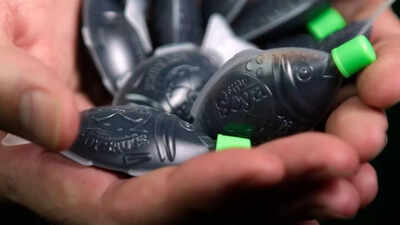
Plastic pollution remains a pressing global environmental issue, and South Australia has taken a notable step to address it by banning fish-shaped soy sauce bottles, the tiny containers commonly used with sushi.
Effective from Monday, the ban targets these miniature bottles because they pose a greater environmental risk than other single-use plastics. As reported by BBC, officials highlighted that the small size of these bottles makes them prone to escaping into waterways, ending up in landfills, or being mistaken as food by marine life. This measure is part of South Australia’s comprehensive plastic waste reduction program, positioning the state as a pioneer in eco-friendly legislation and reinforcing its commitment to sustainable practices across restaurants and food services.
South Australia’s tiny fish-shaped soy sauce bottles banned
Plastic bottles shaped like fish are a familiar sight in sushi restaurants worldwide. While their novelty appeals to consumers, South Australian authorities highlighted the environmental risks posed by these small containers. According to Deputy Premier Susan Close, the bottles are “easily dropped, blown away, or washed into drains,” increasing the likelihood that they reach oceans and waterways.When these bottles end up in recycling bins, their tiny size makes them difficult to process.
Sorting machinery cannot capture such small items efficiently, leading many bottles to either landfill disposal or becoming fugitive plastics in the environment. Experts warn that marine life can mistake these decorative bottles for food, further exacerbating ecological damage.
South Australia’s comprehensive plastic ban
South Australia, home to roughly 1.9 million residents, became the first Australian state to implement a ban specifically on these fish-shaped bottles. This move is part of the state’s ongoing plastic control initiative, which began in 2009 with the ban on single-use plastic shopping bags. Since then, the list of prohibited plastics has steadily expanded to include:
- Plastic cutlery and straws attached to food items, such as juice boxes
- Single-use takeout packaging and coffee cups
- Plastic balloon sticks, confetti, and Q-Tips
The ban also extends to rectangular soy sauce containers holding less than 30 milliliters (1 ounce) and equipped with caps, lids, or stoppers.
Restaurants are now encouraged to adopt larger refillable bottles, sachets, or compostable vessels, reducing the environmental footprint of single-use condiments.
South Australia fish shaped bottles ban: Penalties and enforcement
The ban is enforced by the South Australian Environment Protection Authority, which has the authority to issue warnings or initiate prosecution for non-compliance. This strict enforcement underscores the seriousness of the state government’s commitment to plastic waste reduction.
Global plastic bans expand amid rising environmental concerns
Future bans are also under consideration. For instance, the state plans to prohibit plastic stickers on fresh produce like apples, though the rollout has been delayed to address industry concerns over increased costs and supply chain disruption.
- South Australia’s initiative mirrors a growing trend worldwide to curb plastic waste. Notable examples include:
- New Zealand (2023): Nationwide ban on thin plastic bags used for produce
- Lagos, Nigeria (July 2025): Ban on single-use plastic items, though enforcement has been challenging
The United Nations reports that 2,000 garbage trucks worth of plastic enter oceans, rivers, and lakes daily. With 85% of single-use plastic bottles, containers, and packaging ending up in landfills or mismanaged, plastic pollution is a significant threat to marine ecosystems, human health, and global sustainability.Attempts to establish a binding global plastic treaty recently failed, primarily due to disagreements over production limits. Plastic is predominantly derived from fossil fuels, and oil-producing nations resist regulations that could restrict plastic manufacturing.

 1 month ago
11
1 month ago
11










 English (US) ·
English (US) ·